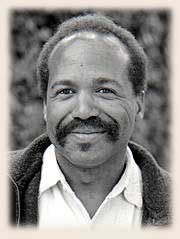| SOIL,
FOOD, & PEOPLE CONFERENCE
March 27-29, 2000
GROW BIOINTENSIVE conference on the U.C. Davis campus
Home
| Intro | Presentations
| Breakout Sessions | Friends:
Old & New | Sponsors
PRESENTATIONS
Urban Farms, Rural Farms, Farmland Preservation
Leonard Diggs | Mas
Masumoto | Marty Strange
 |
Leonard Diggs works his own organic
farm and is also the farm manager of the Santa Rosa Junior College
Shone Farm. He was the recipient of the Pedro Ilic Agriculture
Award for Outstanding Farmer, 1996, and the Outstanding Young
Farmer of the Year Award from the Sonoma County Harvest Fair,
1996. |
Diggs joked about how appropriate his name is
for a farmer, then got down to more serious business. He stated
that the urban recycling mantra is "reduce, reuse, recycle,"
but that in a consumption-based world where only new items are counted
as part of the Gross National Product, it's hard to make reduction
real.
It's like we're all starring in a "B" movie, where we
expect the hero in the white hat to come in and rescue us at the
last moment. At this point, he believes we're looking to biotechnology
to save us.
Diggs stated the rural mantra is "maintainable, sustainable,
organic." He said everyone would have their own list of how
to make that possible, but this is his:
- farmers having sustainable and maintainable lifestyles,
- communities supported by bioregional resources which serve as
successful models of local economic development,
- sustainable positive images of agriculture being projected to
young people through schools and mainstream media, and
- revitalized vocational schools and apprenticeship programs that
would teach young people to maintain first their homes and then
their agricultural resources.
Diggs closed by saying he wanted to use the saying "It takes
a village to raise a child" and modify it to "It takes
a community to maintain a farm."
top
 |
Mas Masumoto is an organic farmer
in California's Central Valley. He is a grower spokesperson
for the California Tree Fruit Growers Association and has served
with the Raisin Advisory Board and the California Clean Growers
Association. He was appointed to the California Council for
the Humanities board in 1994 and now serves as its cochair.
Masumoto is the author of Harvest Son and Epitaph for a Peach. |
Masumoto read an excerpt of what he had written
in praise of the peaches he grows. And he emphasized there's only
one way you can grow that type of peach: by farming slow. He said
there is no way you can rush soil, community, diversity or water.
Masumoto does not believe slow is inefficient. He savors his moments
in the field, enjoying his work and reflections of his family farm.
In contrast, he stated that industrial farming
- fast farming - is based on viewing land as a commodity and depersonalizing
those who work it. He does not believe fast is a natural part of
the human rhythm.
Masumoto said he uses his abilities as a writer
to capture the "slow" stories from his farm and communicate
them to the public. For example, pruning is slow, taking years to
learn. Its lesson is about working with the past to shape the future.
He believes that is what the conference is about.
Good peaches embody sensibilities about
food and the memory of how it should taste. He said that 90% of
the population has never tasted a good peach, which he thinks is
scary. Through stories he can convey an understanding for "the
flavor of the land." He would like farming to be again looked
on as an art. Masumoto pointed out he is not anti-technology but
is only seeking a balance to the high speed of technology.
top
 |
Marty Strange is the former
program director of the Center for Rural Affairs. He is a
leader in the movement for social and economic justice and
environmental reform in rural communities. He is the author
of Family Farming: A New Economic Vision, one of the leading
critiques of industrial agriculture. |
Strange believes that when personal responsibility
becomes a political act, there is a great possibility for change.
He used as an example Gandhi, who politicized
the peasants of India by encouraging them to weave their own cloth,
even though this was a function the British claimed the rights to.
This became the emblem of independence in India. He added that he
looks for the day when gardening is considered a political act in
this country.
Strange spoke about the problems of privatizing
land and asked, "To whom do the fruits of the land belong?"
He said economists used to ponder about what gives value. He personally
believes the relationship between place, work, and consumption to
be central to the issue of what gives value to land.
High-yield farming is the name that has been given
to the current industrial-type agriculture. But it also could be
used to describe the agriculture the conference is about, which
gives the returns for the labor and management to the farmer rather
than to the suppliers of high- input technology. Also, this type
of agriculture produces yields from the land by using the soil wisely.
Strange believes that organic farming is becoming
a system that is more about purity and premiums - and so is attractive
to the industrial system - and less about soil health and stewardship.
He feels the vision we need is one which changes the relationship
between people and land and between producers and consumers.
Getting skills into the hands of people who want
to farm in a healthy manner is going to be a crucial issue. He believes
that the largest underused agricultural resource we have is the
urban poor and that with their cooperation the soul of organic gardening
might be salvaged
top |